30 of the most iconic Olympic photographs of all time
Carl Lewis receives the first of his eventual four gold medals at the 1984 Games in Los Angeles.

Ben Johnson leads the men's 100 meters final at the 1988 Games.
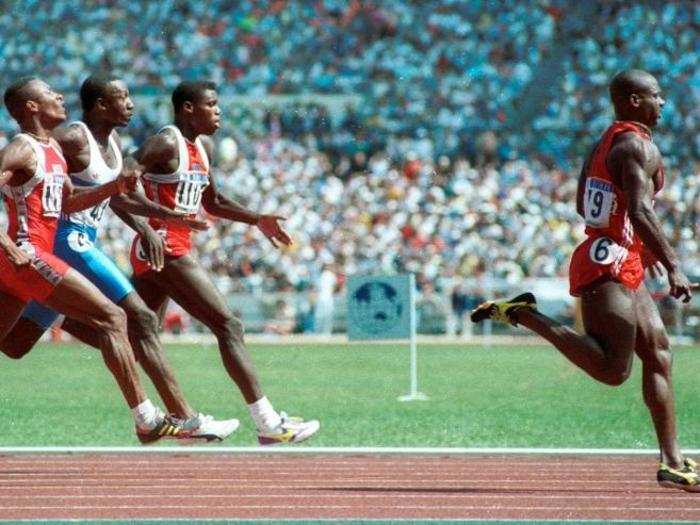
"The race, the first Olympic 100 meters final I would cover, was set for 1.30 p.m. on a Saturday. I was positioned on the side of the finish line. My job was to produce a picture showing how far the winner won the race by. I pre-focused my camera on lane six, Ben Johnson's lane. There was no auto focus in 1988 so in order to ensure I had a picture of him in focus, I set my camera to a spot and waited for him to run through it. The gun went off and about nine seconds later Johnson was in my viewfinder. What was unexpected was that I saw him but not anyone else. How could a runner in a 100 meters race be so far ahead?" - Gary Hershorn
American sprinter Florence Delorez Griffith Joyner (a.k.a. Flo-Jo) crosses the finish line first during the 100 meter final at the 1988 Games in Seoul.
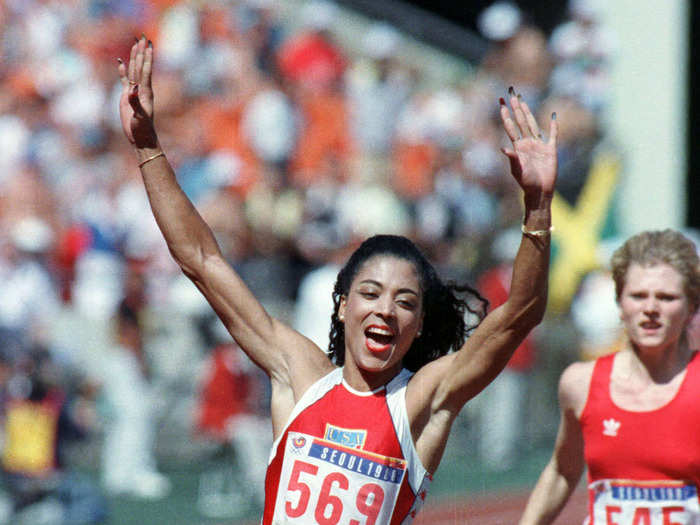
"What most people don’t know about past Olympics is us photographers had to get into position for major races like the men’s and women’s 100 meter finals 12 or more hours before the race and that we had to plan our approach, trying to anticipate what the athlete looked like and would do before, during and after the race in one meter intervals. Having covered Flo Jo at the 1987 World Track and Field Championships I knew that she ran hard all the way to the finish line but once she crossed it she would explode in emotion. In Seoul, Flo-Jo arrived with carefully painted long finger nails and in the 100 meter final, she ran a wind-assisted 10.54, beating her teammate rival Evelyn Ashford by 0.30 seconds and just as planned she exploded with emotion as she crossed the finish line." - Nick Didlick
The "Dream Team" celebrates their victory at the 1992 Summer Olympics in Barcelona.
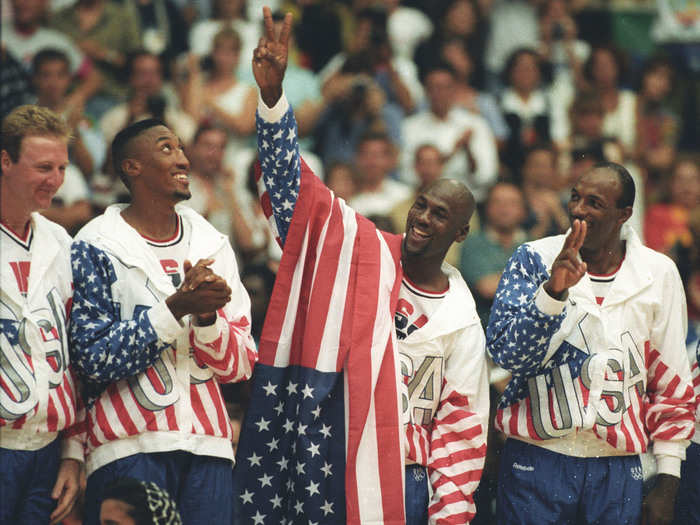
"I’ve been lucky to cover most Olympics from 1980 in Moscow through to the 2004 games in Greece. I’ve seen and photographed a lot of thrilling moments in track and field, gymnastics, wrestling, baseball and softball but the highlight had to be when I saw arguably the greatest sports team ever assembled play. That team was nicknamed the “Dream Team” and was the first U.S. basketball team composed of professional players. Before the 1992 games, only amateur players were allowed to play on the men’s Olympic basketball team. Some teams, including Russia, used players that in the West would have been defined as professional and the USSR team was always a top medal winner. In 1989 FIBA, modified its rules allowing professional athletes to compete internationally and after some debate, USA Basketball asked the NBA to contribute players for the team. During the games the U.S. team averaged an Olympic record of 117.3 points a game, and won by an average of 43.8 points on their way to the gold medal. During the awards ceremony it was apparent that the Olympics really meant something to these hardened professionals. While Charles Barclay was the leading scorer overall, Micheal Jordan led in the games against the tougher rival and silver medalist Croatia. He scored 21 points in the first round game and 22 in the gold medal contest. He also led the tournament with 37 steals. Jordan was on the team that won in L.A. in 1984, the last time the U.S. took home the gold." - Ray Stubblebine
Muhammad Ali lights the Olympic flame to open the 1996 Summer Olympics in Atlanta.
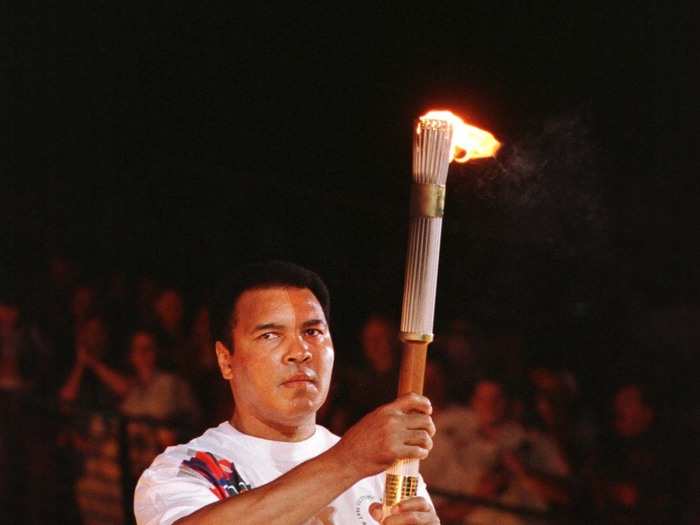
"It was a blustery evening and I was waiting in a pre-positioned area high in the stadium during the opening ceremony. I was positioned for one moment only: to photograph Muhammad Ali lighting the Olympic flame. It had been a long night of celebration and as Beethoven’s 'Ode to Joy' began blasting from the nearby speakers I watched as swimmer Janet Evans ran, torch in hand, from the other end of the stadium and up the ramp toward my position. At that moment Muhammad Ali stepped from the shadows and the two met as their torches touched and Ali’s caught the flame. He then held up the flame for a minute or two turning and saluting the gathered thousands as applause and cheers echoed in the stadium. There were a couple of tense moments when the next stage of the cauldron lighting failed to ignite from Ali’s torch due to wind but shortly after the Olympic flame lit up the night’s sky right on cue. At that moment Ali turned to the crowd again holding his torch." - Andy Clark
Romanian gymnast Lavinia Milosovici competes at the 1996 Games.
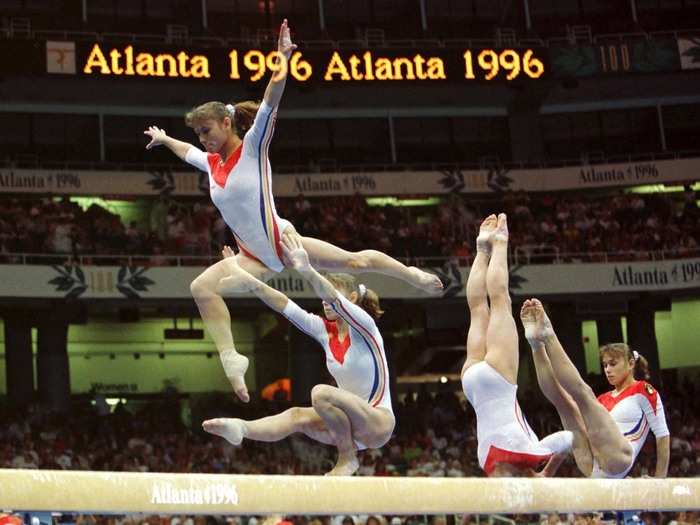
"The Atlanta games were the last Olympics to be shot 100% on film by Reuters. This image of Romanian gymnast Lavinia Milosovici going through her routine was made possible by a very dark background in the gymnastics venue. I shot four exposures on the same frame, keeping the camera still, exposing for the light on the athlete and timing her moves along the balance beam." -Mike Blake
An aide attends to Mike Powell after he injured himself on his final attempt to win gold in the long jump at the Atlanta Games.
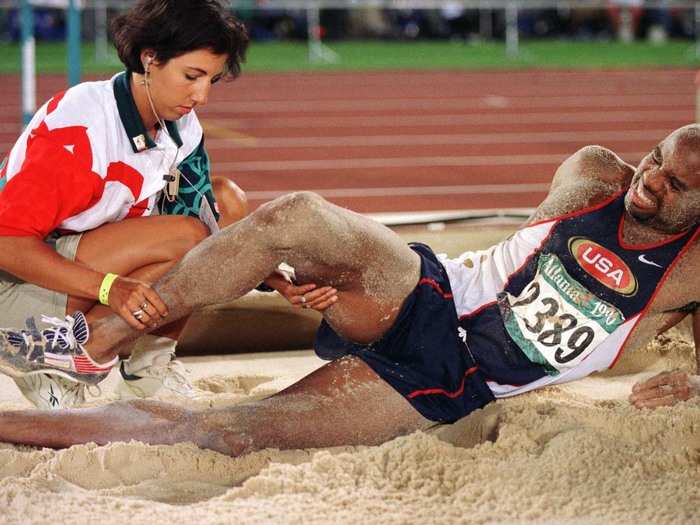
“Carl Lewis was once the world's most interesting, exciting runner over short distances - the Usain Bolt of the 90s. On the other hand Mike Powell was an athlete with extremely long legs, always with a smile. The long jump competition started. Each jumper had three attempts. Lewis and Powell advanced to the last group of final jumpers who received an additional three attempts. It was one of those historic moments in athletics. The lead kept changing between Lewis and Powell after each attempt, both boosting each other. Lewis jumped 8.50 meters in his last attempt. There were sparks in the air when Powell prepared for his sixth and final attempt but when he landed he screamed in pain. The tension was too much for his muscles. He reacted in pain and the aid was the first to help Powell, who’d just failed to win the gold, beaten by a few centimeters.” - Wolfgang Rattay
A tear runs down 400 meter champion Michael Johnson's cheek as the national anthem plays at the 1996 Olympics in Atlanta.
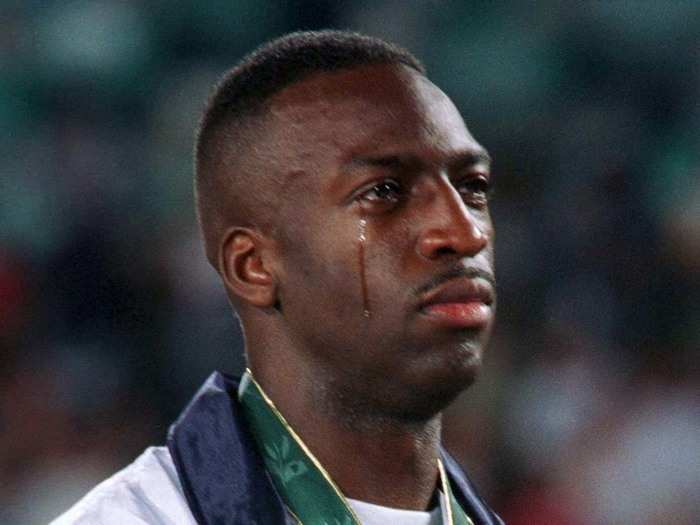
"Michael Johnson was the unbeaten man over 400 meters, always winning by 10 meters or more. He could have taken it easy. From the start Johnson was in the lead and at the end of the race he had claimed gold in Olympic record time. During the medal ceremony a small tear began to form in the eye of the "unbeatable". My first thought was "it's a great moment but the tear is not visible enough to show his emotions". I thought it would never be visible in the image but I was wrong. The tear started to run down his cheek lighting the face of the unbeatable, the invincible runner. The flood lights of the stadium were mirrored in the tears. I asked myself "is it right to take an image of a man in tears?" When the national anthem started the tears flooded down his cheek. My first thought that it could not be visible enough was senseless. the tear had now run down his whole face. I was the witness, the documenter of this very special moment - an Olympic, heroic and a very human moment. We are not machines, we are human beings not computers who do things with the same precision at any given time of the day. Thanks Michael." - Wolfgang Rattay
Two competitors face off during a beach volleyball match at the Sydney Olympics.
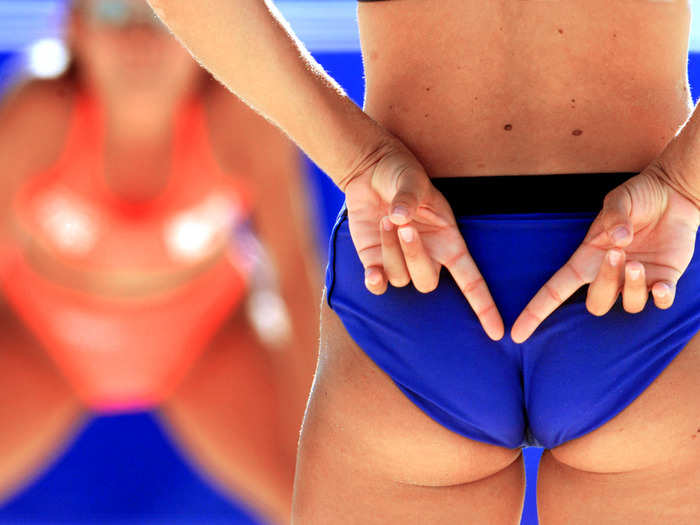
"One of the great things about covering the Olympics is photographing a completely new sport. One of the great things about covering beach volleyball at the Sydney Games was that it took place right on Australia's famous Bondi Beach. In fact, as I think about it, everything about covering beach volleyball at those games was pretty great. Sunny weather, friendly locals, pop music blaring, spectators dancing in the aisles: all as hard-bodied, golden-skinned athletes wearing very little competed for gold - need I say more? Anyhow, this photo seemed to have just the right stuff to become a somewhat iconic image for this wonderfully fun sport." - Kevin Lamarque
American sprinter Marion Jones reacts after winning the 100 meter final at the Sydney Games.
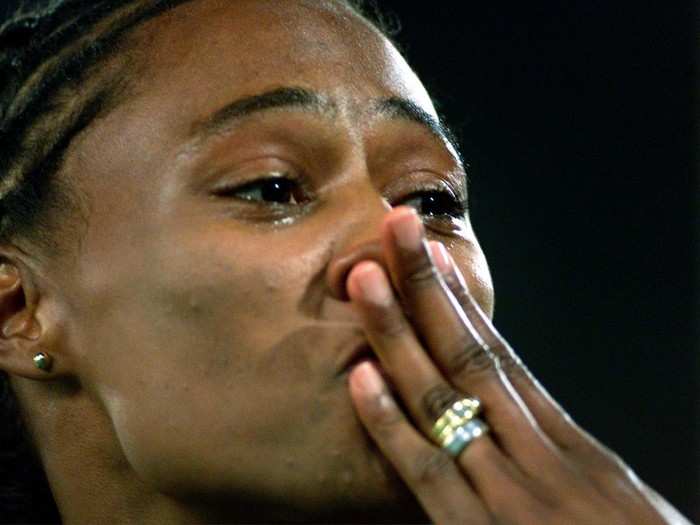
"I was shooting from a set position after the women's 100 meter finish line and although the finish did not go my way, Marion Jones' pause and reaction was right next to me. We have a number of photographers covering these events and we all know to make the pictures that your position gives you." - Mike Blake
Equatorial Guinea' Eric Moussambani struggles through a last-place finish in a qualifying race for the men's 100 meters event to massive applause at the 2000 Games.
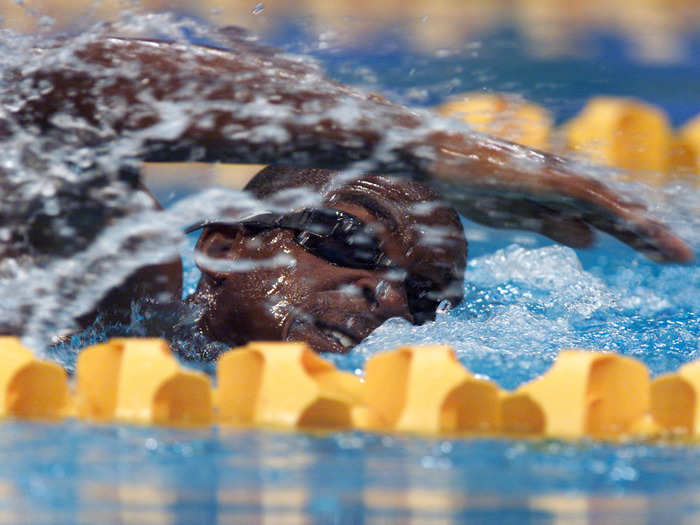
"I was assigned as the pool deck photographer for the Sydney Games, which I was extremely excited about as it was my home town Olympics. The swimming finals at night were always a lot more stressful than the daytime heats. With so many qualifying races for the men's 100 meters, I decided not to worry too much about the heat that ended up being one of the highlights of the Olympics. The heat started with the competitors diving in and straight away I could see that this guy, Eric Moussambani from Equatorial Guinea, was not exactly fast. In fact, he was still touching the end of the first lap as his fellow competitors had almost finished the two pool lengths. I thought I had better get a picture of him in case he disappears under the water. At that very moment, the crowd, who also had not initially paid much attention to the heat, started cheering him on as he struggled to complete his two laps. To be honest, I thought he wasn't going to make it, but pushed on by what was now an almost hysterical crowd, he somehow managed to make the last 25 meters - his head flipping from side-to-side and his teeth clenched. He hung onto the wall for a very long time after, and had to be ushered several times to get out of the pool, as the competitors for the next heat were ready to go. He received another cheer as he exited the pool, which I recall thinking was the loudest I had ever heard for someone who had no chance of winning a medal." - David Gray
The British rowing team celebrates a close victory at the 2000 Summer Olympics.
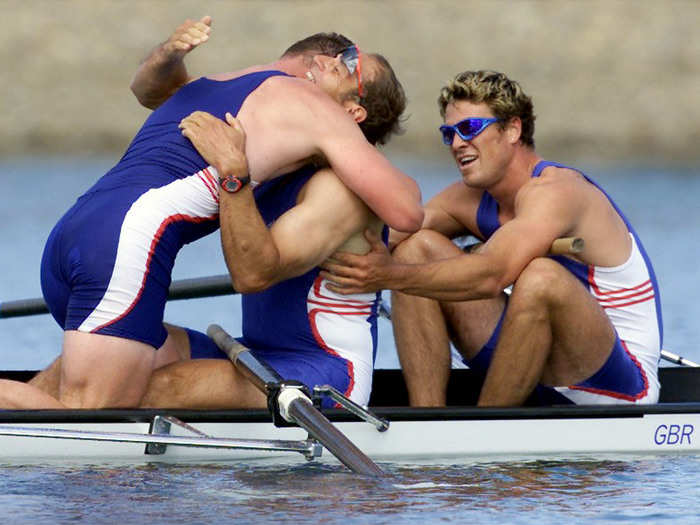
"I had been covering the rowing and arrived at the Penrith venue just before dawn as usual to prepare for the one and only story on this particular day. The great British rower Steve Redgrave was hoping to claim his fifth gold medal in successive Olympics. He had won his first gold in Los Angeles in 1984 and followed up with gold in Seoul in 1988, Barcelona in 1992 and Atlanta in 1996. Competing in the Men’s Coxless Fours, Redgrave and his teammates Matthew Pinsent, Tim Foster and James Cracknell were at their best. They led the race, fighting off a last-minute challenge from the strong Italian team to win the race and the gold. I had positioned myself several meters past the finish line with a 600 mm lens and waited for reaction as the boats crossed the finish line. In the first few moments after their victory, complete exhaustion took over as the four just sat in their boat trying to catch their breath. Slowly the realization of what had happened began to set in. Suddenly Matthew Pinsent in the stern of the boat stood up, turned around and gingerly climbed over teammate Tim Foster, almost tipping all four into the water, and collapsed into the celebratory arms of Redgrave as James Cracknell joined in. A truly Olympic moment." - Andy Clark
Australia's Cathy Freeman wins gold in the 400 meters race for the hometown crowd a the Sydney Games.
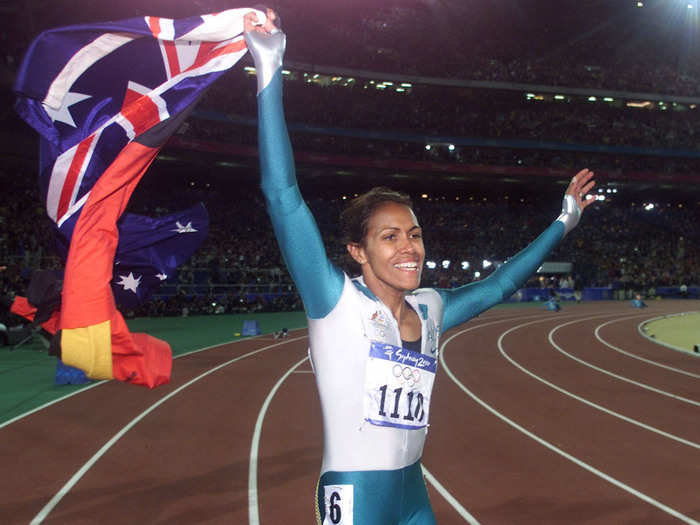
"Australia's Cathy Freeman was under immense pressure during the Sydney Games. Not able to take home the big prize previously, she was now in the final at the Olympic Games on her home turf. The stadium was shaking when she walked in. Aussies were singing their adopted national anthem, 'Waltzing Matilda', and clapping to the beat of Zorba the Greek. The moment was right and all she had to do that evening was to run as fast as she could and pass that finish line in the fastest time. The sound of a home crowd and an Olympic final is something you will only experience a few times in your life if you are lucky. Then silence, you could hear a pin drop. The starter fired his gun and off the athletes went. Freeman finished first and gave the spectators what they had come for: an Australian Olympic champion! I was shooting from the infield position so l had to get the shot of Cathy with the flag and capture her emotion during the victory lap. After chasing her for a while I shouted at her so loudly that she heard me above the roaring crowd and I was able to photograph a very happy emotional Cathy Freeman." - Jerry Lampen
Chinese diver Hu Jia competes at the 2000 Summer Olympics in Sydney.
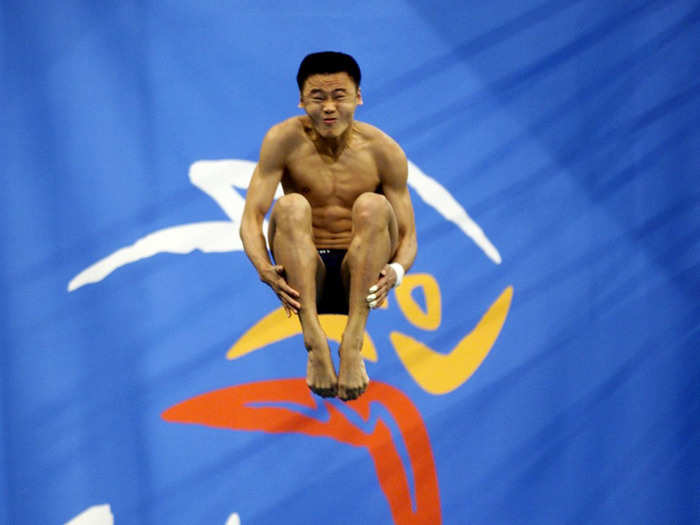
"I've always been fascinated by the sport of diving. Precision and total concentration are two of the most important winning factors for divers. The 10 meter platform event can also be a dangerous and very demanding sport. While covering the competition in Sydney, I tried to combine the right angle, moment and background. I was interested to see the faces of the contestants while diving. This task turned out to be a very difficult one as I had to focus my long lens on thin air. I shot dozens of pictures hoping to freeze the action, have it in focus and also capture an interesting moment. I got lucky with one of the top athletes of the event - Chinese silver medalist Hu Jia." - Yannis Behrakis
A spectator grabs Brazilian runner Vanderlei de Lima while he was leading the Marathon at the Athens Games.
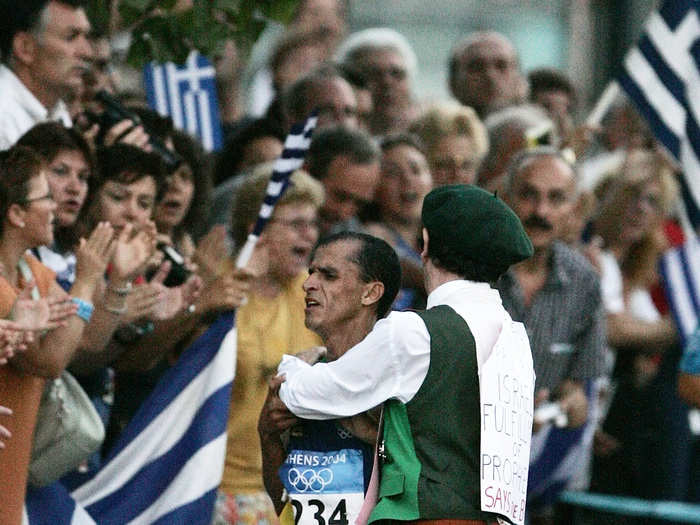
"It was my first time covering an Olympic marathon event. My position was on the truck ahead of the lead group and I had no idea how close we would be to the athletes. I had three lenses, a 500mm, a 70-200mm and a 16-35mm with me. We mostly stayed 15-20 meters ahead but when a spectator grabbed Brazilian lead runner Vanderlei de Lima I was lucky to have the long lens as we stopped some 30 meters away. De Lima got away and rejoined the race, holding his leg, with around 15 minutes to run, but lost the lead to Italian Stefano Baldini soon after." - Ruben Sprich
Justin Gatlin celebrates his victory in the 100 meters final at the 2004 Athens Olympics.
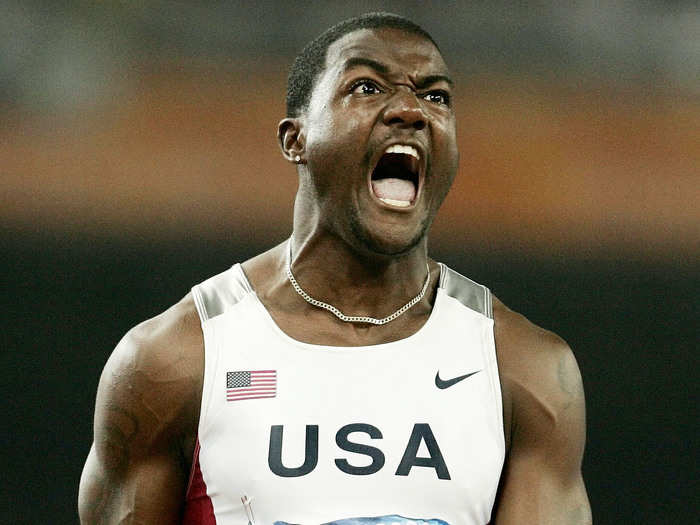
"There is something truly wonderful about an Olympic 100 meters final, and I remember this one vividly. It was a typically lovely, warm Mediterranean evening and as the runners took their marks, the sell-out crowd hushed so much that I could hear my heart pounding. Someone once told me better to be a lucky photographer than a good one. I used up a lot of luck that night and honestly think I was as happy as Justin Gatlin when I saw I had the picture." -Dylan Martinez
China's Liu Xiang wins gold in the 110 meters hurdles final in Athens while Frances Ladji Doucouré stumbles in the background.
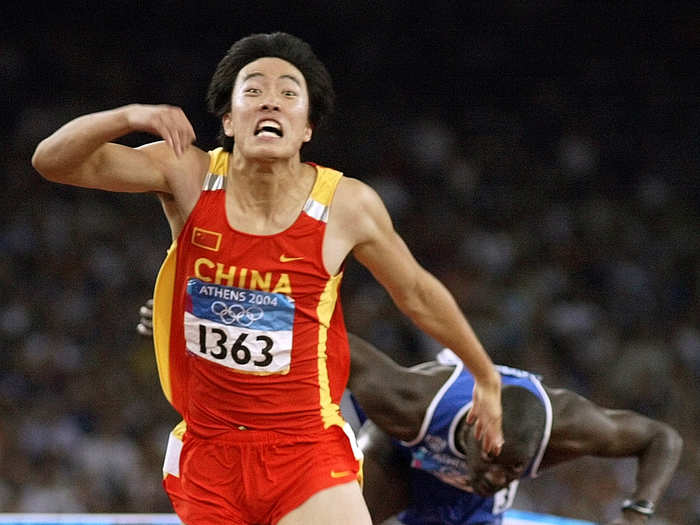
"Preparing for the men's 110m hurdles final in Athens all eyes were on China's Liu Xiang even though France's Ladji Doucouré had the fastest time in the preliminary races. In addition to my hand-held camera, I was shooting the race with four remote cameras which were all were set up and focused on the lane Liu was running in. After the starting gun went off it was apparent early on that Liu was going to win with the lead he took. As the wide-eyed Liu crossed the finish line, Doucoure stumbled behind him giving us a memorable photo of the finish. This picture was captured on one of the track level remote cameras. Liu's time of 12.91 equaled the world record set by Britain's Colin Jackson at the World Championships in Stuttgart in 1993, a race I was fortunate enough to photograph also." - Gary Hershorn
Argentina's Federico Sztyrle rides the horse Who Knows Lilly during the individual elimination show jumping competition at the Athens Olympics.
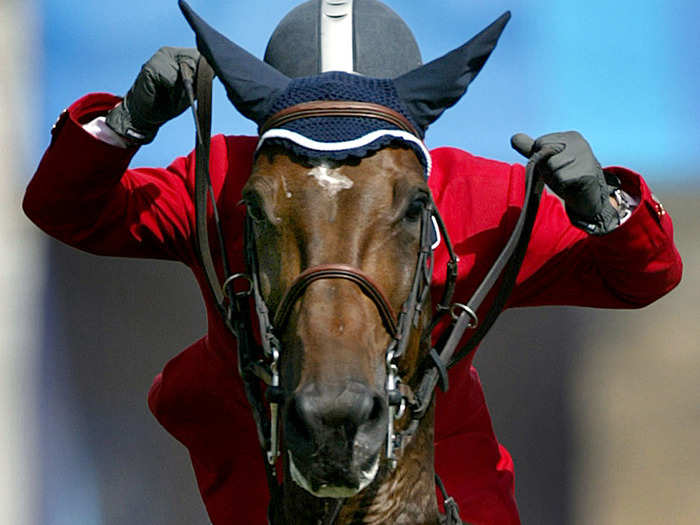
"It was the first major equestrian event I had photographed for Reuters. I had an eye level position on the horses as they took the combination of fences down a straight line in the individual elimination show jumping competition. As Argentina's Federico Sztyrle rode Who Knows Lilly over the jumps I saw between frames that the image could look interesting and as it turned out the helmet, ears and arms fell into place perfectly." - Caren Firoujz
British long distance runner Paula Radcliffe weeps after dropping out seven kilometers before the finish of a 42 kilometer race during the 2004 Olympics.
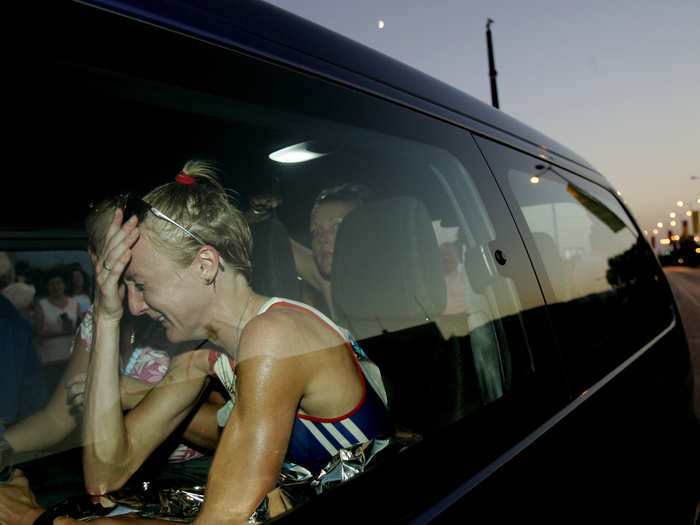
"The 2004 Olympics was a very special assignment for me since Athens is my town. The women’s marathon was not an event I was initially going to cover; in fact I had the morning off. On the morning of August 22, a colleague called me frantically to tell me that he had information that the favorite to win the race, the British athlete Paula Radcliffe had retired about seven km before the end of the 42 km race. I took my equipment, jumped on my moped and drove through back roads and alleys, as all roads were blocked by police, to the place about ten blocks north of my home in Athens. When I arrived, Radcliffe was trying to continue the race but she looked totally overwhelmed by the heat and humidity. At some point she sat on the pavement crying. A few supporters holding British flags tried to comfort her. Shortly afterward a special vehicle arrived to collect her and a couple of other athletes. When she entered the vehicle I guess she had finally realized that it was all over and at that moment she collapsed. I shot two frames through the window." - Yannis Behrakis
The Chinese flag is raised during the opening ceremony at the 2008 Summer Games in Beijing.
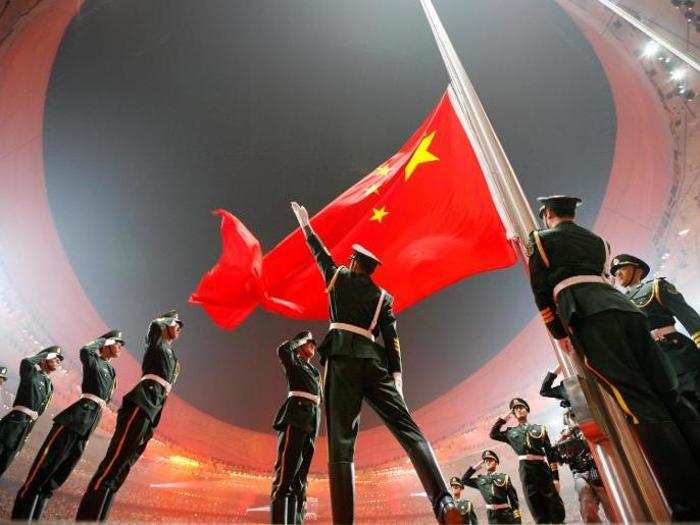
"I was assigned to cover the flag-raising ceremony at the Olympic opening ceremony, which in China was a beautiful and complex ceremony. The national anthem in played and then the flag raising begins with a soldier throwing the flag away from himself and before it hits the ground it is pulled up. I arrived in the middle of the arena, enough space you would think but we were standing in a sort of moat and only just able to look over the edge onto the grass. My eye fell on a small riser which could hold one person and got there first. I stayed on that very spot for almost three hours. Soldiers began to take up their positions and l began to see what my picture could look like. Thankfully, l was carrying a full frame camera with a 16mm wide angle lens as the soldiers were standing so close to me and the stadium had an open roof. l was just able to fit part of the roof and the soldiers in the frame, position the camera and wait for the moment. I had to make the decision to cut off a bit of the first soldiers legs but decided that was alright. There was only one huge problem, the full frame camera at that time was a very slow camera. This was not a camera that allowed you to make a burst of frames but three at the most so l had to peek at the right moment. I waited and waited till the very last moment, as I watched it unfolding in front of my eyes in slow motion. I released the shutter and the flag was flying in the air. In my memory it lasted a lifetime but it was only one second at the most. I took a deep breath and waited to see the photo on the back of my camera. The first shot had no flag in the air, second - thank god - a flag in the air, and third one, the flag was already too high. Mission was completed and l knew l had a winner." - Jerry Lampen
Julien Pillet of France jumps in the air triumphantly after winning gold in the individual sabre event in 2008.
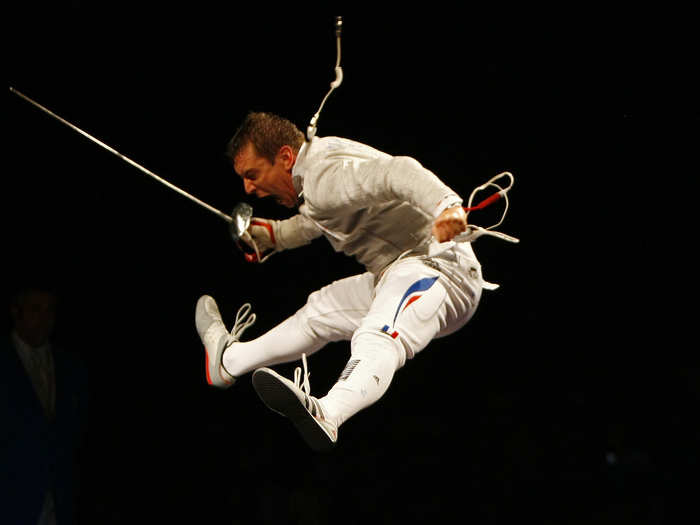
"This was the best moment during a final. In any finals, especially at the Olympics, the celebration is the most important frame as it is the gold medal moment. This was taken right after Julien Pillet of France made the winning point on his rival in the individual sabre men’s final. I was ready and waiting for his celebration but I was still impressed when Pillet jumped so high. I had to react so quickly to shoot this frame. In this victorious moment he exploded in pure joy.” - Stefano Rellandini
Russia's Yelena Isinbayeva pole vaults during the Beijing Games.
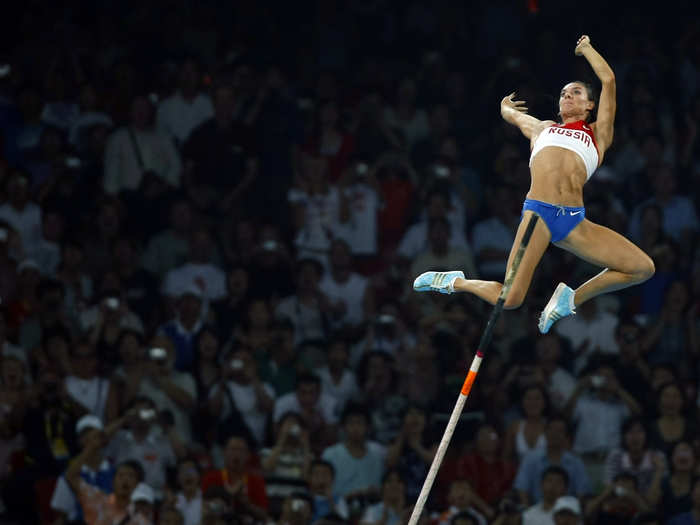
"I had just finished covering gymnastics and was now helping out at the track and field by covering all the medal ceremonies. It is not necessarily the most exciting spot, but every medal won is a story back home for the athlete and Reuters feeds the world it's content so it's a very busy position. This image of Russia's Yelena Isinbayeva was shot with a long lens from across the field as I waited for a medal ceremony to take place." - Mike Blake
Usain Bolt wins the 100 meters sprint and sets a world record at the Beijing Games with his shoe untied.
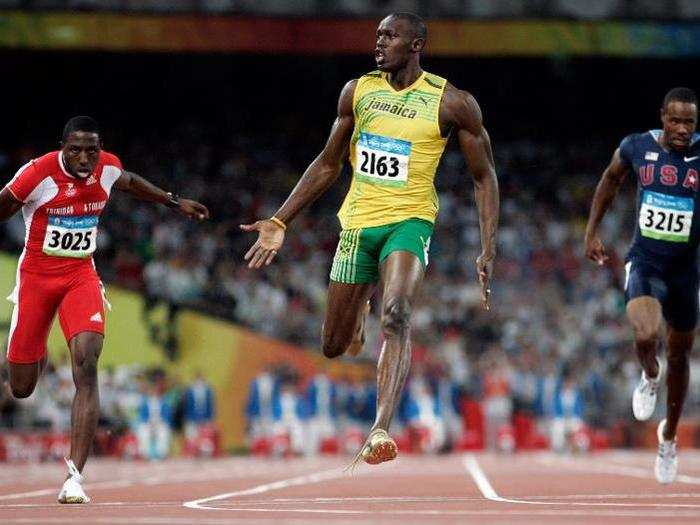
"The summer of 2008 gave the world a phenomenon called Usain Bolt. The summer of fun began in New York in May when Bolt unexpectedly set the world record in the 100m sprint at the Adidas Grand Prix. I was one of about five photographers who happened to be at that race. Just over two months later, this time in front of hundreds of photographers Bolt smashed his own world record winning the 100m at the Beijing Olympics. After he won I remember photographers talking about how he had won with his shoelace untied. The hand-held camera I was shooting with didn't really show this but I was happy to see one of the low level remote cameras I had set up shooting straight down his lane perfectly showed his shoelace untied." - Gary Hershorn
Michael Phelps competes in the 4x100 meter relay medley during the 2008 Olympics while en route to winning a record eighth gold metal.
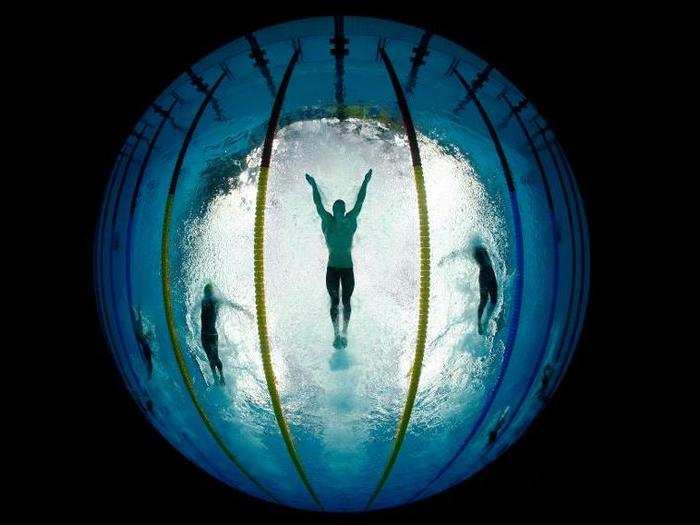
“The swimming events of the Beijing Games were very special. Everybody was writing that Michael Phelps could beat Mark Spitz’s record Olympic haul of seven gold medals at the 1972 Munich Games. The program of the 2008 Olympics had been changed in order to give Phelps the chance to overcome Spitz’s long-held record. I had become a specialist in making underwater images of swimmers. Together with a friend of mine we developed a reliable underwater housing unit and system for the camera that transmitted the images taken instantly to my laptop sitting right next to me. This race was for a potential eighth gold. I had bought an 8mm round short lens and had in mind to make Phelps look like Mr. Universe swimming ahead of everyone. In the men’s 4x100 m relay medley, Phelps was chosen to swim the butterfly leg. I hoped he would be well ahead of the other swimmers to make him look like the superb swimmer that he is. When I looked at my images, the race was still going; I saw that it had worked out perfectly, even better than I had planned. Phelps looked like he was the one and only swimmer in the globe.” – Wolfgang Rattay
The moon is perfectly positioned behind the Olympic logo hanging from the Tower Bridge in 2012.
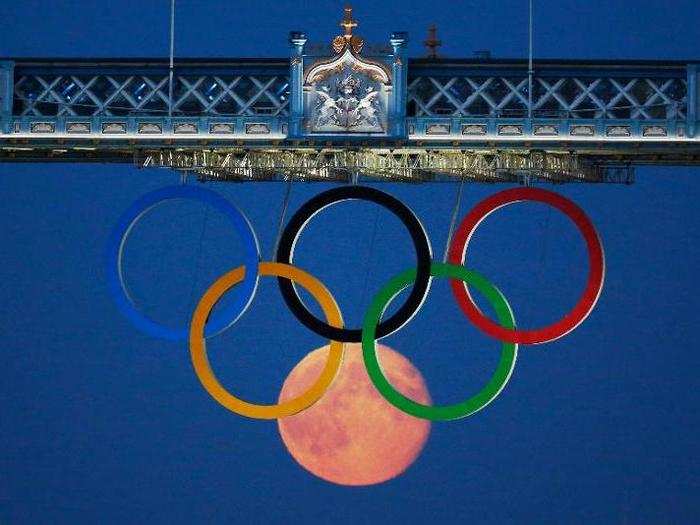
"With very little understanding of astronomy but with the aid of a phone app, I began a three evening attempt to capture the moon with the Olympic Rings. Day One – Having planned to be in the “perfect” spot on London Bridge with a good view of the Olympic Rings further up river and using the app information, I waited for the moon to rise. However the horizon itself was a little cloudy. When the moon eventually showed itself about 10 minutes after the app’s moonrise time it was off to the right hand side of the bridge. Day Two – Armed with my 400mm, only a monopod and less gear, ready to run after the moon should I be in the wrong location again, I returned to London Bridge. A recalculation had been made. The moon was rising later and at a slightly different angle to the night before. From my previous mistakes I knew that when the moon was on the horizon it needed to be to my left in order for it to move across through the rings. However, to my dismay, the rings were not there. As Tower Bridge is a combined bascule and suspension bridge (i.e. the carriageway lifts to allow boats through) it had raised in preparation to allow a vessel through. Day Three – The moon would be rising at 8:50pm and would hit the rings by about 9pm. As the moon had been rising later each evening it had become darker than the previous evenings. Exactly on time the moon began to show itself over the horizon, a lovely peachy color. I had to keep an eye on a changing exposure, balancing the brightness of the moon with a rapidly darkening sky. As it rose I had to keep moving along, mercilessly pushing tourists out of the way who had stopped to look, in order to keep the moon in line with the rings. Finally, after three days, I had the picture I had been trying to achieve." - Luke MacGregor
An athlete performs at the individual all-around rhythmic gymnastics final at the London Summer Games.
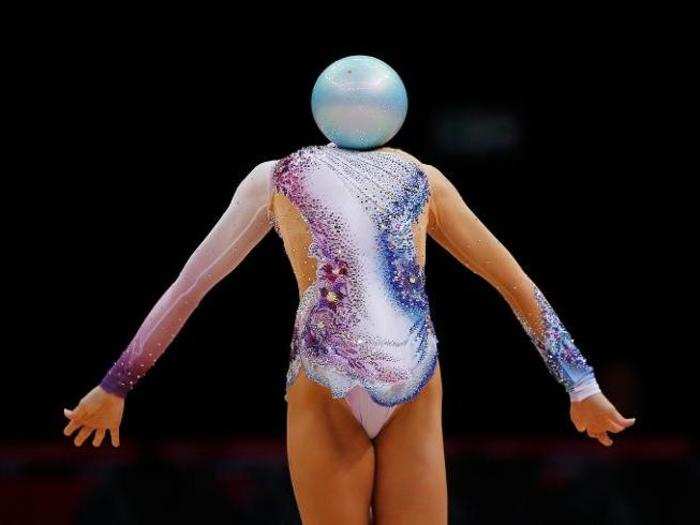
"This surreal image was taken during the individual all-around rhythmic gymnastics final at Wembley Arena during the London Games. It is one of those frames that I knew when I shot it, something strange had happened, something special. Covering an event where there are so many good photographers shooting from all angles means you need a little luck to get something different. Rio 2016 will be my fourth consecutive Olympic Games and this picture is one of my favorites." - Marcelo Del Pozo
Guam's Ricardo Blas Jr. wins the first round of the men's heavyweight competition in 2012.
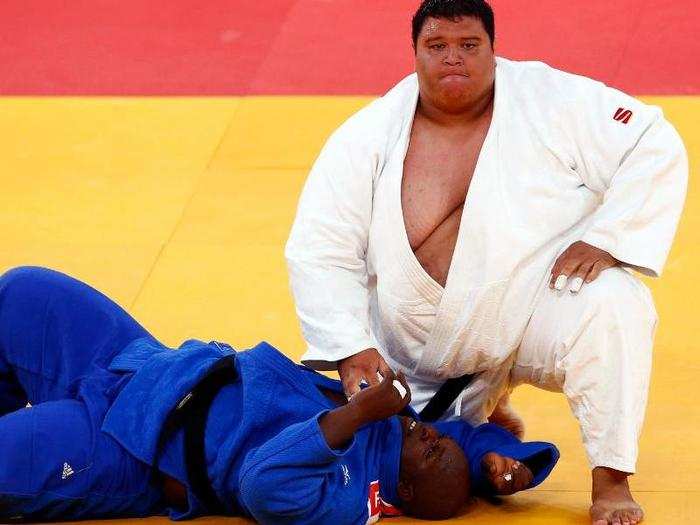
"There are no prizes for guessing how Guam's Ricardo Blas Jr. earned his nickname 'The Little Mountain": at 218kg, he is the heaviest competitor of the modern Olympic Games. I've photographed most sports, but until the London Games, never judo. Compared to others, the pace of this contest was pretty slow and I have to admit didn't require a lot of skill as a photographer. I could only shoot from one position in the tribune because I was also operating a robotic camera in the roof. So, I was pretty lucky when Blas won in the first round and was facing my direction. He was an instant hit with the crowd but sadly the imposing figure of Ricardo Blas failed to make a big impression in the men's heavyweight competition after losing his next fight to Cuba's Oscar Brayson. Characters like him are larger than life and bigger than sport - and that's what makes the Olympics come alive." - Darren Staples
German discus thrower Robert Harting rips apart his shirt after winning gold in London in 2012.
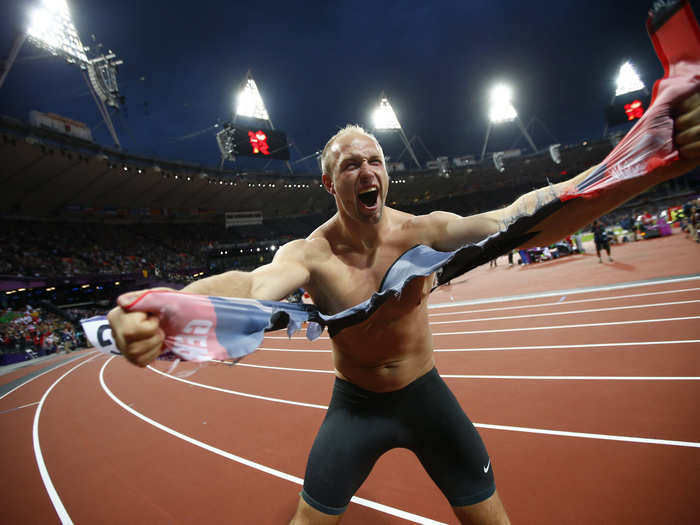
"I remember this picture very well. German discus thrower Robert Harting gets quite emotional during competition and had pulled apart his shirt once before after winning a World Championship. So the handful of infield photographers often ran back and forth with him. Luckily I was fast enough for this shot as a fraction of a second later a colleague who came in late tried to hold his camera in front of mine as he could not pass me. Of course it's always nice to take pictures of a fellow countryman winning a gold medal. With Harting it was very special as he always fights for athletes rights, including better financial benefits for the "throwers"." - Kai Pfaffenbach
Gaby Douglas competes at the 2012 London Games.
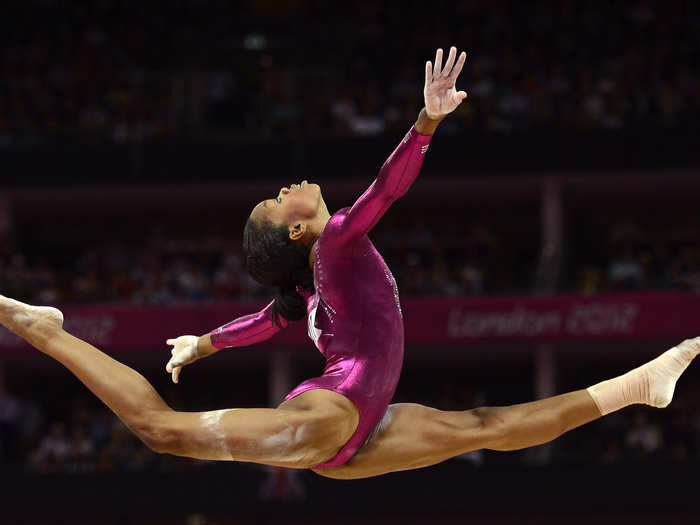
"Who cannot be in awe of these little (really they are all tiny) gymnasts? The work, sacrifice, and sheer pain they put their bodies through is beyond amazing. Gabrielle “Gaby” Douglas was a delight to watch. She had it all; the smile, the charisma and of course a body that could contort into any shape she seemed to desire. In this picture Gaby is at the peak of her movement on the way to gold at the London Olympics - the best city in the world." - Dylan Martinez
Distance runner Mo Farah and sprinter Usain Bolt switch victory poses after both winning gold at the 2012 London Games.
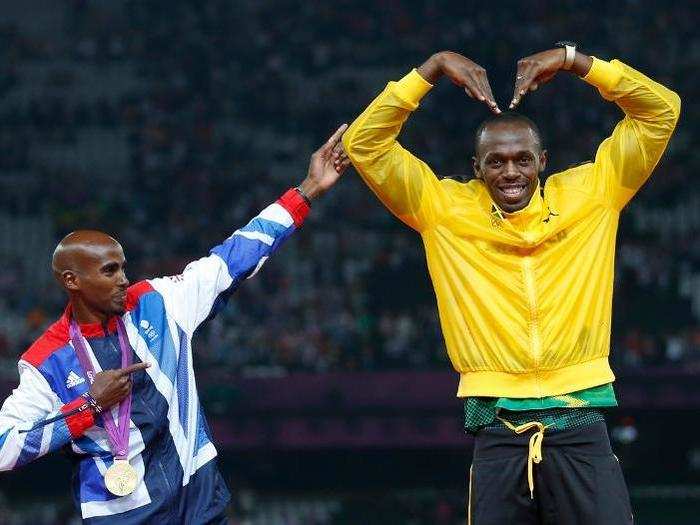
"'So who wants to photograph all the medalists?’ Silence. It was the final meeting of the Reuters photo team that would cover all the athletics at the Olympic Stadium. I was in a room of world-class photographers and the medals had my name written all over it. Funnily enough doing the medals produced one of the most iconic pictures of the London Olympics when Usain Bolt met Mo Farah after receiving his gold medal for winning the 5000m. Usain suggested they swap signature poses. It was a lovely moment, an historic picture and I was a very happy man when I saw the pictures on the back of my camera." - Eddie Keogh
Popular Right Now
Popular Keywords
Advertisement